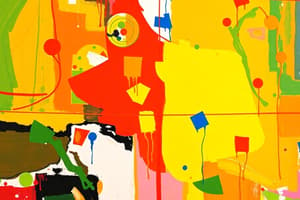Podcast
Questions and Answers
What is the main focus in Fitts and Posner's Cognitive Stage?
What is the main focus in Fitts and Posner's Cognitive Stage?
- Refining movements
- Understanding the task (correct)
- Reducing errors through practice
- Developing automatic movements
In which stage of Gentile's 2-stage model do learners focus on developing a movement pattern?
In which stage of Gentile's 2-stage model do learners focus on developing a movement pattern?
- Initial stage (correct)
- Later stage
- Associative Stage
- Autonomous Stage
According to Fitts and Posner's model, in which stage do movements become automatic and require minimal conscious effort?
According to Fitts and Posner's model, in which stage do movements become automatic and require minimal conscious effort?
- Initial Stage
- Autonomous Stage (correct)
- Cognitive Stage
- Associative Stage
What distinguishes Gentile's 2-stage model from Fitts and Posner's three-stage model?
What distinguishes Gentile's 2-stage model from Fitts and Posner's three-stage model?
Which stage in Fitts and Posner's model focuses on refining movements and reducing errors through practice?
Which stage in Fitts and Posner's model focuses on refining movements and reducing errors through practice?
What is the main focus of Schmidt's Schema Theory?
What is the main focus of Schmidt's Schema Theory?
In the context of the Motor Learning and Control Theory, what is the significance of feedback?
In the context of the Motor Learning and Control Theory, what is the significance of feedback?
What does the Ecological Dynamics Theory emphasize in motor skill acquisition?
What does the Ecological Dynamics Theory emphasize in motor skill acquisition?
According to Information Processing Theory, what is a key element in ongoing learning and assessment?
According to Information Processing Theory, what is a key element in ongoing learning and assessment?
How does Positive Feedback contribute to motor skill learning?
How does Positive Feedback contribute to motor skill learning?
Flashcards are hidden until you start studying
Study Notes
Theories of Motor Skills and Abilities
Fitts and Posner's Three-Stage Model
- The cognitive stage involves understanding the task and developing a mental representation
- In the associative stage, focus shifts to refining movements and reducing errors through practice
- In the autonomous stage, movements become automatic and require minimal conscious effort
Gentile's 2-Stage Model
- The initial stage involves understanding the nature of the task and developing a movement pattern
- The later stage emphasizes refinement of movements and adaptability to different conditions
Schmidt's Schema Theory
- Schema theory proposes an abstract memory representation for events (open loop schema)
- Generalized motor program rules allow for the generation of novel movements
- Rapid, ballistic movements involve recalling memory with motor programs and parameters to carry out movement without peripheral feedback
- Variability of practice improves motor learning, and error production is beneficial for learning
- Schema has rules for all stored elements, not just the correct ones
Motor Learning and Control Theory
- This theory focuses on how individuals acquire and refine motor skills through practice and experience
- Principles involved include practice variability, feedback, and transfer of learning
- Variability of practice allows individuals to adapt to different situations
- Feedback can be intrinsic (from personal experience) or extrinsic (from external sources or equipment)
- Effective feedback provides information on how to improve a movement or action
- The goal is for the skills learned during practice to be transferable to different contexts
Ecological Dynamics Theory
- This theory emphasizes the interaction between an individual and their environment during motor skill acquisition
- It highlights the importance of perception, action, and the environment working together for effective skill development
Information Processing Theory
- Developing motor skills involves encoding, storing, and retrieving data
- Perception, memory, and attention are key components of motor skill acquisition
- Feedback is a crucial element of the incremental process of ongoing learning and assessment
- Providing frequent and ongoing feedback is essential for improving achievement in learning
Studying That Suits You
Use AI to generate personalized quizzes and flashcards to suit your learning preferences.




